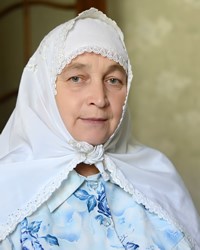Tatar in Russia

Photo Source:
Copyrighted © 2026
Shamilini - Shutterstock All rights reserved. Used with permission |
Send Joshua Project a map of this people group.
|
| People Name: | Tatar |
| Country: | Russia |
| 10/40 Window: | No |
| Population: | 4,699,000 |
| World Population: | 5,725,900 |
| Primary Language: | Tatar |
| Primary Religion: | Islam |
| Christian Adherents: | 3.00 % |
| Evangelicals: | 0.49 % |
| Scripture: | Complete Bible |
| Ministry Resources: | Yes |
| Jesus Film: | Yes |
| Audio Recordings: | Yes |
| People Cluster: | Ural-Siberian |
| Affinity Bloc: | Turkic Peoples |
| Progress Level: |
|
Introduction / History
The Tatar are a group of Turkic people with sizable colonies in virtually every republic of the former Soviet Union. Although most of them live around the Volga region, others inhabit Azerbaijan, Byelorussia, Ukraine and the Central Asian republics. The name Tatar means "archer."
The Tatar have had a strong civilization since the tenth century. It has survived the Mongol invasion of the thirteenth century and the Russian conquest of the sixteenth century. In the 1800s, Tatar cities ranked among the greatest cultural centers of the Islamic world.
The physical appearance of the Tatar varies from blue-eyed blondes to Mongoloid features. In general, they have oval faces with little facial hair. They speak a unique language called Kazan Tatar, although many now claim Russian as their mother tongue. The Tatar are a settled people, mostly peasants and merchants, who have completely lost their traditional tribal structure.
What Are Their Lives Like?
The Tatar often seek work outside their native region, following a trend of mobility established before 1917. Some work in Russian manufacturing industries and petroleum refineries. Many of those in the Volga region work on collective (community) farms where they raise grains, hemp, legumes, and other fodder crops.
In urban areas, the Tatar live no differently than modern Russians. However, those living in rural areas still hold to their pre-Revolutionary traditions. For example, up to three generations may live under one roof.
Among the Tatar, the father is the legal head of the household. He is also in charge of the family income and how it is spent. The women usually cook, carry water, wash clothes, and tend to the livestock, while the men do more strenuous labor in the fields. Most Tatar are well educated. There are 1800 libraries in Tatarstan, having over 20 million books in Tatar. The Tatar people enjoy the arts - especially theatre, the orchestra, opera, and ballet.
Although the Tatar are primarily Islamic, many still observe sabantuy, or "rites of spring." This is an ancient agricultural festival that is celebrated simultaneously with the anniversary of the founding of the Russian Tatar Republic on June 25. These celebrations have their origins in Shamanism (the belief in an unseen world of gods, demons, and ancestral spirits).
The younger generation of Tatar wear contemporary city-style clothing. However, the older, collective farm members wear traditional dress. Many Tatar will identify themselves as Muslims before they identify themselves as Tatar. Unlike devout Muslims, however, some of the Tatar will eat pork, and very few observe the prescribed Islamic fasts.
What Are Their Beliefs?
Most of the Tatars are Hanafite Muslim. While Muslims believe that there is only one god, many Tatar still honor saints and holy places. Some beliefs in supernatural powers such as the "evil eye" (the ability to curse someone with a glance) still exist from their pre-Islamic days.
The Tatar's Volga area has been an Islamic stronghold since the ninth century. Nevertheless, the Tatar's beliefs remain more liberal and intellectual than the beliefs held by the more Orthodox Muslims of Central Asia or the Caucasus. For instance, in many of their mosques, prayer times have been arranged so as not to conflict with work schedules. Women have also been encouraged to join the men at the mosques instead of praying at home, as is the usual custom.
Unfortunately, the Tatar's view of Christianity has been scarred by the Russian Orthodox church and its attempts to convert them through coercion. During the 1600s and 1800s, their mosques were frequently burned. The few who were "converted" by these measures returned to their Islamic faith when oppression ended.
What Are Their Needs?
Christian laborers are needed to live and work among the Tatars of Russia. Translation of the Bible began in the 1970s. The New Testament was completed in 2001.
Prayer Points
We must pray that the word of God will be completed, well-distributed, read and understood by the Tatar.
Pray that the nominally Orthodox Tatars would come to know Christ.
Pray that God would bless the outreach efforts of a large Tatar church in Kazan.
Ask the Lord to call people to share Christ with the Tatar.
Ask God to use Tatar believers to share the love of Jesus with their friends and families.
Ask the Lord to raise up strong local churches among the Tatar that will plant more churches.